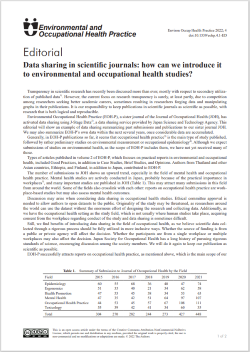#E0050 Data sharing in scientific journals: how can we introduce it to environmental and occupational health studies?

Ways to Foster Data Sharing for Environmental and Occupational Health Studies
Data sharing is an important component of scientific research that allows the seamless circulation of data, making it globally accessible to researchers. It is, therefore, important that scientific journals prioritize publishing logical and reproducible research, with transparency in the described methods. However, current emphasis on research transparency is influenced by the competition among researchers for better academic careers, which have resulted in data forging and manipulation. This warrants measures to preserve the integrity of scientific research and facilitate its reproducibility.
As part of its efforts to promote data sharing, an editorial by the Environmental Occupational Health Practice (EOH-P) journal provides details of a new service to make data publicly available. The service is termed “J-stage data” and shares data from previous submissions and publications to the Journal of Occupational Health (JOH), a sister journal of EOH-P.
Most EOH-P publications involved studies on occupational health practice, followed by preliminary studies on the environment measurement or epidemiology. The articles in EOH-P volume 2 included case studies, good practices, brief studies, and opinions, which were mostly contributed by authors from Japan, Thailand, Ethiopia, and Finland. While the number of submissions in EOH-P did not show an upward trend, those for JOH continued to increase, especially for mental health and occupational health practice. Owing to its practical importance in workplaces, mental health is an attractive research topic that accounted for maximum submissions from across the world.
The repeated replication of datasets from occupational and mental health studies can compromise their originality. As a result, data sharing for these studies requires an approval from the Ethics Committee, before it is made publicly accessible. Besides, because these studies are conducted in specific workplace settings, obtaining consent for data sharing may be difficult. The editorial also discusses the advantages of sharing occupational health data. As an evolving research area, any data gathered through a systematic and time-consuming process, should be made available to multiple users for its re-application.
Data sharing is likely to be affected by the funding source (private or public agency), and the study type (single-center or multi-center study). Although a conflict of interest may create obstacles, it increases the significance of the study by allowing its repeated and varied analysis. In conclusion, data sharing must be encouraged and facilitated to ensure the authenticity and secondary utilization of published data.

Link to original journal article:
https://www.jstage.jst.go.jp/article/eohp/4/1/4_4.1-ED/_article
Title of the paper:
Data sharing in scientific journals: how can we introduce it to environmental and occupational health studies?
Authors:
Narufumi Suganuma, Akizumi Tsutsumi, Eiji Shibata, Tetsuo Nomiyama




